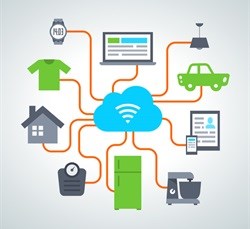
At the Consumer Electronic Show 2015, the Internet of Things (IoT) or the 'Internet of Everything', depending on who you spoke to, was everywhere, from ceiling fans and dishwashers, to watches and sprinkler systems - everything was smarter and connected.
According to Yaron Assabi, founder of Digital Solutions Group (DSG), retailers may need to rethink the traditional retail store, as consumers accustomed to their connected devices at home, cars and in the workplace will grow to expect similar experiences while shopping.
"Retail is now less about transactions and more focused on the relationship between the consumer and the retailer. The Internet of Everything and surging smartphone penetration will mean a shift to a focus on personalisation of experiences."
Assabi points to the example of beacon technology internationally, which works on Bluetooth low energy. Beacons communicate with a shopper's smartphone, in the hope of improving the in-store shopping experience. "These connected touch points and real-time access to customers and their data will allow retailers to offer targeted and personalised promotions and customer experiences.
"Based on permission of course, contextual and relevant messages will be pushed to a consumer's mobile phone and will completely change shopping experiences. Customers could be guided through the aisles, based on their shopping list or previous purchase behaviour and items that they are most likely to buy. Staff will greet them by name and FMCG brands could offer personalised vouchers to stimulate top of mind awareness, repeat purchase and additional wallet share."
A recent KPMG study, undertaken by technology business leaders globally, found that retail and intelligent shopping has the greatest potential to generate revenue because of adoption of the Internet of Things.
The growing demands from customers for improved and efficient service is powered by the rise of mobile technologies, as well as social media's ability to impact reputation - both good and bad. In addition, the quick adoption of low cost smartphones and the fact that mobile penetration is now at 133% in South Africa, also makes this channel very relevant. With a swipe of a finger, or a quick snap of a QR code, customers are making mobile technology a part of their everyday lives.
These solutions provide great customer insight and 'big data', which may seem overwhelming at first, but can be used effectively to improve overall customer experience.
Retailers should learn how to utilise the data effectively to avoid missed opportunities for relevant communication at the point of purchase and on the other hand be cautious, to ensure that they do no not over communicate or are seen as 'Big Brother', which will result in customers opting out of information sharing.
In-store, Wi-Fi via a free app that can connect to in-store beacons, provides a great way to allow customers to "opt in" for communications in exchange for free services.
The retailer is then able to provide personalised offers and create 121 conversations with their customers such rate products and services or even provide a wish list for items not in stock or not available in store. The insight can provide a way for the retailer to enhance the experience over time and ensure that they re-invent their business based on customer feedback.
"Retailers need to adapt to the changing technology landscape and evolving consumers, through a mix of online and offline personalised experiences, which all aim to make shopping more convenient, relevant, and create loyalty, customer entanglement and therefore new revenue streams," he concludes.